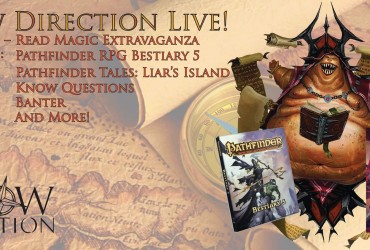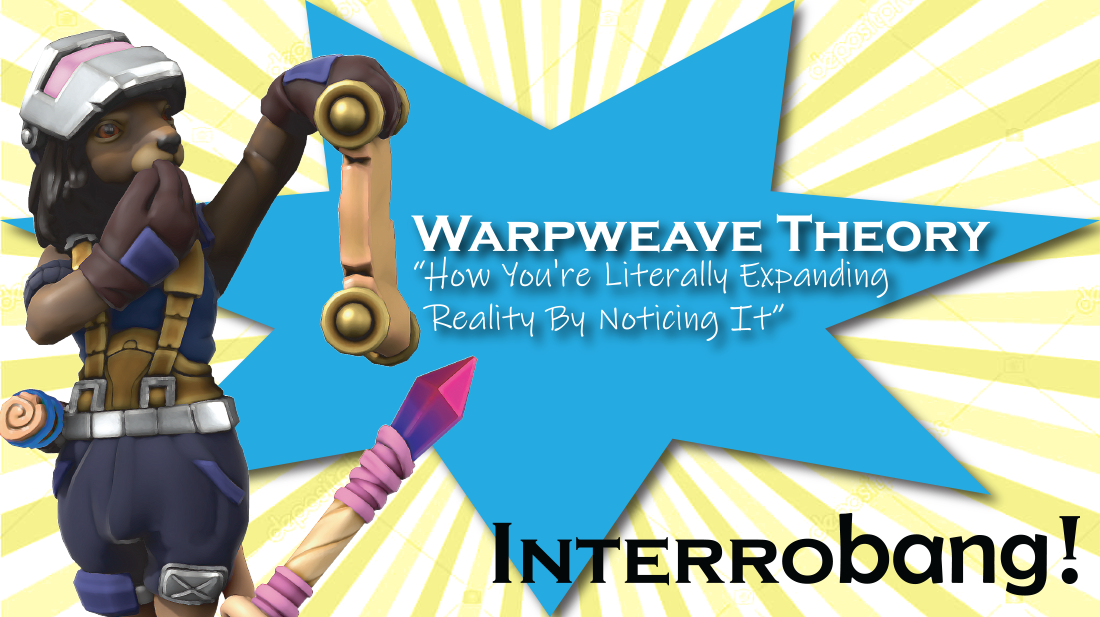Welcome to Guidance, Private Sanctuary’s source for tips and techniques for the Pathfinder Roleplaying Game, written by Everyman Gamer Alexander Augunas. Today, we’re going to be talking about using the character trait system to adjust the power of a high-power PC race.
House rules. Pretty much every single person on the Know Direction Network has talked about them at least once. Ryan’s been in a podcast about house rules. Anthony’s written an article about his house rules. Perram’s done a bit of work with them too. With all this in mind, I guess its somewhat strange that I haven’t talked about house rules much, so that’s what I’m going to do today.
Eventually, I might end up talking about what makes a good house rule, but that isn’t the focus of today’s article. Instead, I’m going to talk briefly about a small house rule that I’ve adopted for my home games. One that’s apparently popular enough that another one of the gamers at my table uses it for her Reign of Winter campaign that some of my PFS friends and I are playing in. Without any further build-up, my house rule: variable traits.
The Situation
How often does this happen to you? You’re getting ready to make a new character for a campaign, and you’re looking through the races. Your GM has told you that just about every race that Paizo has published is available, and you really want to play a gnome ranger who dual wields. That’s awesome, right? You make your character and head to the table to play.
When you arrive, you find that another player at your table also wanted to use multiple melee weapons to fight. The difference, however, is that your friend is playing a kathasa, and kathasas have four arms. Your friend takes Multiweapon Fighting, and by sheer number of arms, he bests you in every way that counts. From a straight one-to-one conversion, your kathasa friend is more powerful than you at low levels because his race is more powerful. So you shrug and play your gnome recklessly until he dies. And when he does so, surprise, you roll up an exceedingly powerful character of an exceedingly powerful race too. You’re an azlanti human, blessed with all of the benefits of being human combined with bonuses to every ability score. Huzzah!
Variable Traits
The problem that I described above has NEVER happened to me, but as many of you know I don’t play with many power gamers. I play mostly with heavy roleplayers. A few months ago, however, I agreed to run Jade Regent for a group of my PFS friends and I immediately thought about who I was playing with. Generally speaking, many PFS gamers are more power-inclined than roleplaying inclined, which is fine by me. Personally, I don’t care much of there are androids or kathasas or whatever at my table, who I care about are my other players who DON’T necessarily want to play those races. I decided that I needed some sort of home rule in place that gave people a reason that they might consider a lower-power race like gnomes or dwarves or even kobolds as opposed to androids or kathasa or aasimar or whatnot. Of course, I also know that as characters level up, the benefits provided by one’s race tend to diminish in effectiveness, so whatever I gave my players couldn’t be something that was so powerful that it completely made the high-power races irrelevant. That’s where the basic idea for my variable traits system came from.
Sidestepping for just a moment, when I’m talking about traits, I’m referring to the character traits that were made famous by the Pathfinder Roleplaying Game Advanced Player’s Guide. Typically, all characters begin the game with two traits, and can choose more by taking a drawback (from Pathfinder Roleplaying Game Ultimate Campaign). In my house rule, that static “two traits per character” gets varied based upon the power of the race in question. As a general rule, my breakdown looks like this:
- Standard Races (10–12 RP or no asterisks [*] in Inner Sea Races): three traits.
- Advanced Races (15–20 RP or two asterisks [*] in Inner Sea Races): two traits.
- Mighty Races (21+ RP or two asterisks [*] in Inner Sea Races): one trait.
This should look similar to the categories outlined for standard, advanced, and monstrous races in the Advanced Race Guide; the big difference is that I expanded standard races to be up to 12 RP so elves were included; elves are 11 RP, so according to the Advanced Race Guide they’re actually advanced races.
At any rate, the basic idea is that if you’re a member of a less powerful race, you make up for it slightly by getting a bonus trait over something like an aasimar, and if you’re a member of a very powerful race, you have to sacrifice a trait to unlock it. In the long run, this might not be a huge deal to the players; if your player wants to be a four-weapon wielding kathasa, losing a few traits over her allies isn’t likely to deter her. But ultimately, the point of the system isn’t to deter people from playing powerful races as opposed to reward players who stick with the more common choices. Rewards rather than punishments have been a hallmark of Pathfinder since the disbaning of 3.5 Favored Class Rules, and I think it’s a worthy trend to keep.
Now Usable at Home!
Before I end out this article, I want to provide everyone at home with the list that I use with this system, in case you want to use it too.
Standard Races
Catfolk
Changeling
Dhampir (All ethnicities allowed, provided they use their Inner Sea Races rules.)
Dwarf
Elf
Gillman
Grippli
Goblin (You need a REALLY good backstory to play this race.)
Gnome
Half-Elf
Half-Orc
Halfling
Human (All ethnicities except Azlanti allowed.)
Ifrit
Kitsune
Kobold (You need a REALLY good backstory to play this race.)
Monkey Goblin (You need a REALLY good backstory to play this race.)
Nagaji
Oread
Ratfolk
Samsaran
Sylph
Tengu
Triaxian (You need a REALLY good backstory to play this race.)
Undine
Vanara
Wayang
Advanced Races
Aasimar (All ethnicities allowed, provided they use their Inner Sea Races rules.)
Aquatic Elves
Drow
Duergar
Fetchlings
Hobgoblin (You need a REALLY good backstory to play this race.)
Lashunta (You need a REALLY good backstory to play this race.)
Skinwalker (All ethnicities allowed, provided they use their Inner Sea Races rules.)
Suli
Vishkanya
Powerful Races
Android
Gathlanis (You need a REALLY good backstory to play this race.)
Ghorans
Kasatha
Merfolk
Strix
Svirfneblin
Syrinex
Trox
Wyrwood (You need a REALLY good backstory to play this race.)
Wyvaran (You need a REALLY good backstory to play this race.)
Side Note: Depending on the campaign, I sometimes alter the list to suit the theme or story that I want to tell. For example, if I really want my players to consider a drow PC, I might bump them from two traits to three. I might also disallow races from my list based upon the adventure concept. For example, in my Jade Regent game, I disallowed the following races: Drow, Duergar, Merfolk, Strix, Svirfneblin, Syrinex, Kasatha, Trox
Well, that’s the gist of the house rule covered for today. What do you think? What house rules do you use in your campaigns? How do you offset powerful races in your game? If you’re a classic 3.5 player, do you think Pathfinder should bring back Level Adjustment? Leave your answers and questions below, and I’ll see you next Monday for another installment of Guidance. Take care.
Alexander “Alex” Augunas has been playing roleplaying games since 2007, which isn’t nearly as long as 90% of his colleagues. Alexander is an active freelancer for the Pathfinder Roleplaying Game and is best known as the author of the Pact Magic Unbound series by Radiance House. Alex is the owner of Everyman Gaming, LLC and is often stylized as the Everyman Gamer in honor of Guidance’s original home. Alex also cohosts the Private Sanctuary Podcast, along with fellow blogger Anthony Li, and you can follow their exploits on Facebook in the 3.5 Private Sanctuary Group, or on Alex’s Twitter, @AlJAug.






